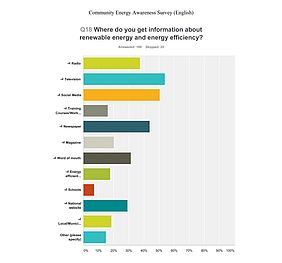The SECURE partners, through the project partner the Ecology Action Centre (Canada) have published the results of the Community Energy Surveys taken place in Donegal and Leitrim (Ireland), Derry and Strabane (Northern Ireland, UK) and Nova Scotia (Canada).
This is the third article about the conclusions from this survey.
When asking the participants about some suggestions or thoughts on energy improvement in their regions, they have come up with many different ideas. To mention some of them, citizens from Donegal (Ireland) have proposed the following:
- An incentivised scheme offering a reasonable return on investment should be made available for solar & biomass installations in domestic dwellings
- Energy companies should do more to inform their customers of the offers available which could reduce their bills.
- Community schemes would reduce installation cost and benefit many people equally.
- Give grant aid to people and clear information.
- Higher building standards.
- I believe that people need to be made more aware of the need for change in relation to our energy sources at the minute and the importance of this change our environment for future generations to come. There should be energy awareness adverts and programs on national TV on a regular basis to create awareness!
- Invest in Natural resources eg. Wind Water and Wave Solar.
- Upgrading of public lighting to LED.
Participants from Leitrim (Ireland) have highlighted the following opinions:
- Increase in grants to assist home middle income home owners to upgrade.
- More incentives.
- More information about what is available and what grants if any are available and the eligibility.
- More information and long term coat effective information needed about energy sources and applications.
- Reduction of street lighting in the middle of the night in small towns. More education on benefits and dealing with counteracting bad publicity for wind energy in this region
- Region already has a proliferation of wind turbines - not against them but would like to see other sources of energy generation even small scale systems enabling isolated households to live somewhat "off grid".
In Derry and Strabane (Northern Ireland), some the participants have said the following:
- More Insulation in Buildings.
- not enough being done to enhanced the power of the rivers systems.
In Nova Scotia (Canada) citizens have highlighted that:
- If a single resource was presented that helped to show the upfront cost and how many years it would take to pay it off, I would be much more likely to take action. The thought of doing the research is a deterrent.
Exemplar building and businesses
Asked about different buildings or businesses in their regions that could be exemplar due to energy efficiency systems or renewable energy practices in their communities, citizens have highlighted the following ones, among others, in Donegal: LYIT or Public Services Centre in Letterkenny. In County Leitrim they have mentioned, for example, Aura leisure centre and County Council’s building. In Derry and Strabane, they have selected Creggan Country Park and The Crest Centre South West College, between others. From Nova Scotia, participants have named, i.e., Halifax public library and our SECURE project partners’ the Ecology Action Centre building.
Where do people get information about renewable energy and energy efficiency?
Interviewees have mentioned that they receive information mainly from radio, television, newspapers and social media. They have named training courses, workshops, magazines, word of mouth, energy efficient public spaces, schools and national, local and municipal websites as well.
About participants
Nearly 200 people, between 15 and more than 70 years old, have taken part in SECURE’s energy awareness surveys. 54.49% of these participants were women. 84% of these people own a home nearly 80% of the interviewees live in a detached house; the rest of them live in a semi-detached house, a flat or apartment and terraced house.
- Read our first article (published in May 2017).
- Read our second article (published in June 2017).



